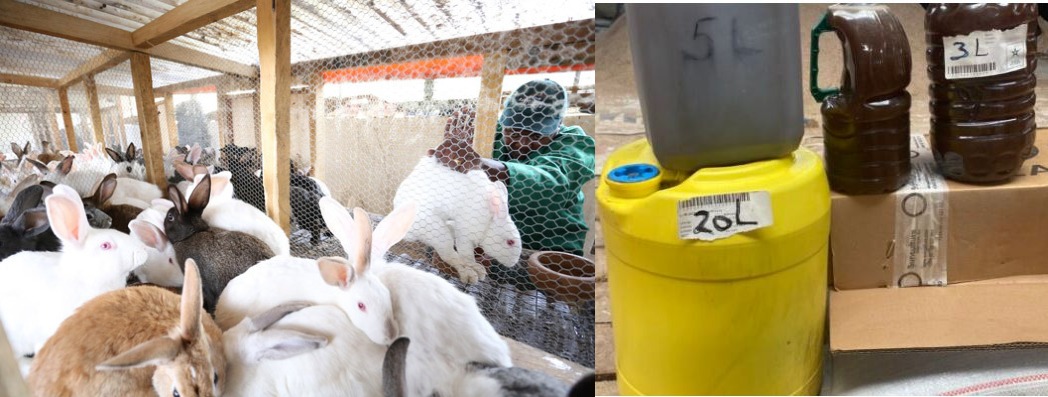Rabbit urine has, over the years, been regarded as a powerful fluid that farmers looking to improve their yield at low production costs can use.
The fluid which can be used as a fertilizer and pesticide is said to contain high levels of nitrates, phosphorus and potassium, which are needed by the plant to grow. In addition, it is environmentally friendly and non-toxic.
James Kibuku, a farmer in Nakuru is earning big from the sale of rabbit urine as farmers in the region shift to more affordable organic farming.
The farmer explains that he diverted to rabbit farming after a failed poultry business. His farm christened Kibuku Rabbit Farm, supplies tender rabbit meat to local restaurants and households and urine to farmers in the region.
“Kibuku Rabbit Farm supplies tender rabbit meat to local restaurants and households within Nakuru. The lean, protein-rich meat gaining popularity, especially among health-conscious consumers, really promoted the farm and as well it gained popularity,” he told KNA.
“Apart from meat, I also bottle and sell rabbit urine—a potent organic fertiliser to the local farmers flocking to Kibuku Farm, eager to boost their crops with this golden elixir,” Kibuku added.
He notes that Rabbit urine is effective in killing whiteflies and other sap-sucking insects that attack crops like vegetables, pawpaws, coffee, macadamia, bananas, and avocados.
Indbro Brown: Layers breed that can lay up to 300 eggs on low-cost feed
Through various training sessions conducted on his farm, Kibuku says many farmers in the region have adopted rabbit urine as a fertilizer and pesticide hence reducing the cost of production while increasing yield and conserving the environment.
“Families in Maili Sita have found an additional income stream through rabbit farming. Children have learned responsibility by caring for the bunnies.
“Rabbit urine replaced synthetic fertilizers, enriching local soils as this rabbit farm has demonstrated sustainable practices,” he explains.
Consolata Atuti a farmer who also rears rabbits in Kiserian says in oder to harvest as much urine as possible, the rabbit cage should be made using a wire mesh floor which the animals rest on.
Underneath, a slightly slanted iron sheet is placed which directs urine to a gutter and, thereafter, to a container for collection.
One litre of fresh rabbit urine mixed with 20 litres of water is adequate for use as a pesticide and foliar.
“I harvest 150 litres of rabbit urine per week for production of organic fertilizer, which translates to an average of Sh30,000 per week,” she says, noting that one litre of the urine retails at Sh250.
To add value to the final product, Atuti says she supplements the rabbits’ feed with amino acids and minerals.
“I feed them on Far Pellets which are rich in amino acid and minerals. These soft pellet feaces are re-ingested by the rabbit to supplement their nutritional needs,” she says.
While the venture is very profitable, Atuti says getting a reliable market can be challenging.
“A ready market is not easy to find unless you go for it. Market is there if you take time to look for it. People take time to accept new ideas, hence market is slow,’’ she says.
Her major clients for rabbit urine include organic vegetable and strawberry farmers whose products are considered sensitive.




